In every system, whether marred by corruption or not, there exists an inherent order and a set of rules within the dynamics of power. The specific ways in which power is exerted or enforced, driven by underlying motives, begin to reveal these rules. Understanding these rules offers us a strategic advantage, but to do so, we must first learn to navigate the game of power, so to speak.
Grasping the elements of power and their expression across various domains, on both national and international levels, is crucial to truly understanding the intricacies of power dynamics. Within this framework, the role of Non-Governmental Organizations (NGOs) is multifaceted. They frequently serve as watchdogs, advocates, or facilitators, building bridges and providing checks and balances within the power structure.
Yet NGOs can also be conduits for exploiting power dynamics, either in constructive or detrimental ways. They might be leveraged for abusive power practices or, conversely, to expose and challenge such abuses, advocating for necessary policy changes. The key lies in discerning and comprehending the interplay among all these entities, a critical step towards navigating and influencing the complex web of power.
In the intricate landscape of power dynamics, the interplay between the elements of power, domains of power, and the role of Non-Governmental Organizations (NGOs) forms a complex web of influence and interaction.
At the core are the elements of power: Financial Capital, which in a free-market society not only accumulates wealth but also exerts a magnetic pull on other forms of power; Political Influence, inherently responsive to the public will but also vulnerable to the sway of financial capital; Information Control, where the free flow of information is often under the subtle control of those with significant financial resources; and Legislation, a governing process that intersects and is molded by the forces of financial, political, and informational influences.
Within these elements operate various domains of power. Think Tanks and Policy Groups shape policy and legislation, often influenced by the political and financial realms they aim to influence. Environmental, Social, and Governance (ESG) standards have begun to significantly influence corporate behavior and investment strategies, thereby impacting financial capital and shaping legislative processes.
Legislative and Regulatory Bodies, the cornerstone of law-making, find themselves under the influence of both political and financial powers. Financial Alliances and Initiatives exert a substantial impact on global financial trends and policies, being both influenced by and influential over financial capital. Finally, Global Economic Systems, which embody national and international economic policies EconomicPolicy and practices, stand at the intersection of financial and political dynamics on a global scale.
NGOs, while not a distinct domain of power themselves, play a crucial role in this landscape. They have the capacity to sway investment and funding, thereby impacting financial capital. Their lobbying efforts for legislative changes can significantly affect political influence and the legislation process. By shaping public opinion and disseminating knowledge, NGOs become key players in the realm of information control. Their collaboration with various domains of power allows them to exert influence while also being influenced by these very domains.
The categorization of these elements, domains, and the role of NGOs is crucial for a nuanced understanding of how power is exercised and influenced. It sheds light on the intricate ways in which financial resources can sway political decisions, how the control of information can shape public opinion and legislation, and how NGOs act as vital intermediaries in these processes. Understanding these inter-linkages is key to grasping the complex dynamics of power and influence in society, highlighting the interconnected nature of these forces and the potential for various actors to effect change at different levels. This knowledge is vital for anyone looking to navigate, understand, or influence the multifaceted world of power dynamics.
Elements of Power
Financial Capital: In a free-market society, the accumulation of wealth is not just possible but encouraged. Financial capital becomes a center of gravity, pulling various forms of influence and power toward it.
Political Influence: The governance structures in a free society, from local councils to the federal government, are designed to be responsive to the will of the people. However, they are also susceptible to the influence of financial capital, which can steer policy and decision-making.
Control of Informatiion: A free society values the free flow of information. Yet, the platforms that disseminate this information are often controlled by entities with significant financial capital, creating a pathway for influence over public opinion and knowledge.
Influence of Legislation: The codification of laws and regulations is a natural process in any organized society. In a free society, this process is ideally democratic, but it is also a point where the influences of financial capital, political sway, and information control converge. Democratic ideology is the source of corruption. If we operate under our true governance of a constitutional republic, I believe that their influence would not be as effective.
By understanding these dynamics as inherent to the functioning of a free society, we equip ourselves with the knowledge to either disrupt or manage these forces effectively. The aim is not necessarily to dismantle the system but to ensure it serves the broader principles of freedom, equality, and justice upon which the United States was founded. Let us explore each element in detail.
Domains of Power
Think Tanks and Policy Groups: These are organizations that perform research and advocacy concerning topics such as social policy, political strategy, economics, and technology. They often play a crucial role in shaping policy debates and influencing legislative decisions.
Environmental, Social, and Governance (ESG): ESG refers to the three central factors in measuring the sustainability and societal impact of an investment in a company or business. It's a domain increasingly influencing how companies operate and how investors allocate capital.
Legislative and Regulatory Bodies: These are government agencies and bodies responsible for creating and enforcing laws and regulations. They play a critical role in shaping the legal framework within which individuals and entities operate.
Financial Alliances and Initiatives: These refer to collaborations and programs involving financial institutions, corporations, and sometimes governments, focusing on specific financial goals or projects. They can significantly impact economic trends and policies.
Global Economic Systems: This encompasses the worldwide network of economic activities and institutions that determine the economic policies, trade agreements, and financial flows that transcend national borders, influencing economies globally.
Relationships of Power
1. Financial Capital:
Financial Alliances and Initiatives: They directly influence and are influenced by the accumulation and flow of financial capital.
Global Economic Systems: These systems are fundamentally built upon and driven by financial capital.
2. Political Influence:
Legislative and Regulatory Bodies: They are at the core of political structures and influence, shaping laws and policies.
Think Tanks and Policy Groups: These groups often exert significant political influence through research and advocacy.
3. Information Control:
Think Tanks and Policy Groups: By providing research and policy proposals, they also influence the information flow in political and social debates.
4. Legislation:
Legislative and Regulatory Bodies: As the primary creators of legislation, they are central to this element.
Environmental, Social, and Governance (ESG): ESG principles are increasingly becoming part of legislative considerations, impacting corporate and financial regulations.
Influence of Power
1. Think Tanks and Policy Groups:
Political Influence & Information Control: These organizations often shape public policy and influence legislators through research and advocacy. At the same time, they control the flow of information by producing reports, policy papers, and media content that can shape public opinion and knowledge.
Legislation & Financial Capital: By influencing policy and legislative processes, think tanks can affect market regulations and financial policies, thereby impacting the distribution and flow of financial capital.
2. Environmental, Social, and Governance (ESG):
Legislation & Financial Capital: ESG criteria are increasingly integrated into corporate governance and investment strategies, influencing legislative agendas focused on sustainability. This, in turn, affects financial capital as investors and companies align their strategies with ESG principles.
Political Influence: ESG issues, such as climate change and social justice, are now significant political topics, influencing the agendas of political parties and candidates.
3. Legislative and Regulatory Bodies:
Political Influence & Financial Capital: While these bodies create and enforce laws (legislation), they are also influenced by political pressures and financial lobbying, demonstrating the flow of influence from financial capital to political decision-making.
Information Control: Regulatory decisions can influence what information is publicly disclosed by companies, thus controlling the information available to investors and the public.
4. Financial Alliances and Initiatives:
Financial Capital & Global Economic Systems: These alliances often shape and are shaped by global financial trends and policies, illustrating the symbiosis between individual financial initiatives and the broader global economic context.
Political Influence: Financial alliances can lobby for favorable policies or regulatory changes, demonstrating their influence on political processes.
5. Global Economic Systems:
Financial Capital & Legislation: Global economic policies and agreements can dictate national economic legislation and influence the flow of financial capital across borders.
Political Influence: International economic agreements and systems often reflect and shape the political power dynamics between nations, influencing global politics.
These examples underscore how domains of power are not isolated; they interact and influence each other across various elements. The power dynamics in one domain can ripple through others, illustrating the interconnected nature of financial, political, and information spheres.
Non-Government Organizations Influence
Non-Governmental Organizations (NGOs) play a significant role in affecting elements and domains of power, often influencing and being influenced by them. Here's how NGOs can impact various elements and domains:
1. Financial Capital:
Influencing Investment and Funding: NGOs can drive or divert financial capital through advocacy campaigns, directly influencing corporate behavior and investment trends. For example, an NGO focusing on environmental conservation can lead campaigns that pressure investors to withdraw from environmentally harmful projects.
Global Economic Systems: NGOs often collaborate with international bodies and governments to implement development projects, influencing the flow of financial capital in global economic systems.
2. Political Influence:
Legislation and Regulatory Bodies: Many NGOs actively lobby for legislative changes, influencing the creation and modification of laws. For instance, human rights NGOs often push for legislative reforms to protect vulnerable populations.
Policy Advocacy: NGOs can shape political agendas by advocating for specific policies, working closely with think tanks and policy groups to influence government decision-making.
3. Information Control:
Public Opinion and Awareness: NGOs play a crucial role in shaping public opinion by disseminating information on various issues, from human rights to environmental conservation. This can lead to a shift in how the public perceives certain issues, indirectly influencing political and financial decisions.
Research and Reports: NGOs often conduct research and release reports that can influence public discourse and policy debates, aligning with the domain of think tanks and policy groups.
4. Legislation:
Shaping Laws and Regulations: NGOs frequently engage in advocacy work to influence the legislative process. For example, NGOs focused on consumer protection may advocate for stricter product safety laws.
Inter-linkages with Domains of Power:
Think Tanks and Policy Groups: NGOs often collaborate with or act as think tanks themselves, conducting research and advocacy in specific policy areas.
Environmental, Social, and Governance (ESG): NGOs are pivotal in promoting ESG principles, influencing how companies and investors incorporate these factors into their decision-making processes.
Financial Alliances and Initiatives: NGOs can be part of financial alliances, particularly those focused on sustainable development and social welfare projects.
Global Economic Systems: NGOs influence global economic systems through their involvement in international development and humanitarian aid.
NGOs, through their advocacy, research, and campaigns, can significantly influence various aspects of power. They often act as a bridge between the grassroots and the higher echelons of power, bringing attention to issues that might otherwise be overlooked by traditional power structures. Their role in shaping public opinion, influencing legislation, and impacting financial decisions highlights their importance in the broader landscape of power and influence.
Understanding the nuances of power, including the ways in which corporations, governments, regulatory bodies, and non-governmental organizations exert their influence, is critical in analyzing the various domains they operate within. Recognizing the dynamics of these elements of power is essential for comprehending the interrelationships and mutual influences among these entities. This intricate web of power relations, domains, and influences forms a complex system. Educating oneself about this system allows one to discern underlying rules and realize the potential influence one can exert as a citizen.
Understanding power dynamics on both international and national levels equips us as citizens to identify areas where we can potentially exert influence. Adopting a systems approach enhances transparency and aids in understanding how different systems interact, a crucial aspect in scenarios where corruption is a significant concern. This foresight enables us to anticipate and address issues proactively. Such an understanding should be a fundamental expectation from a government that is 'of the people, by the people, and for the people,' ensuring that citizens are equipped to participate actively and knowledgeably in their governance.

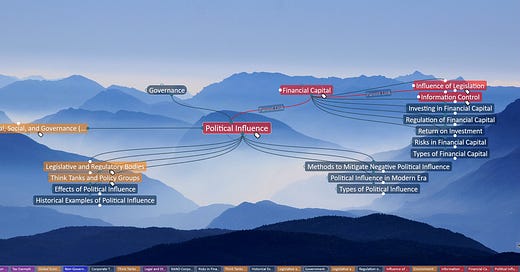



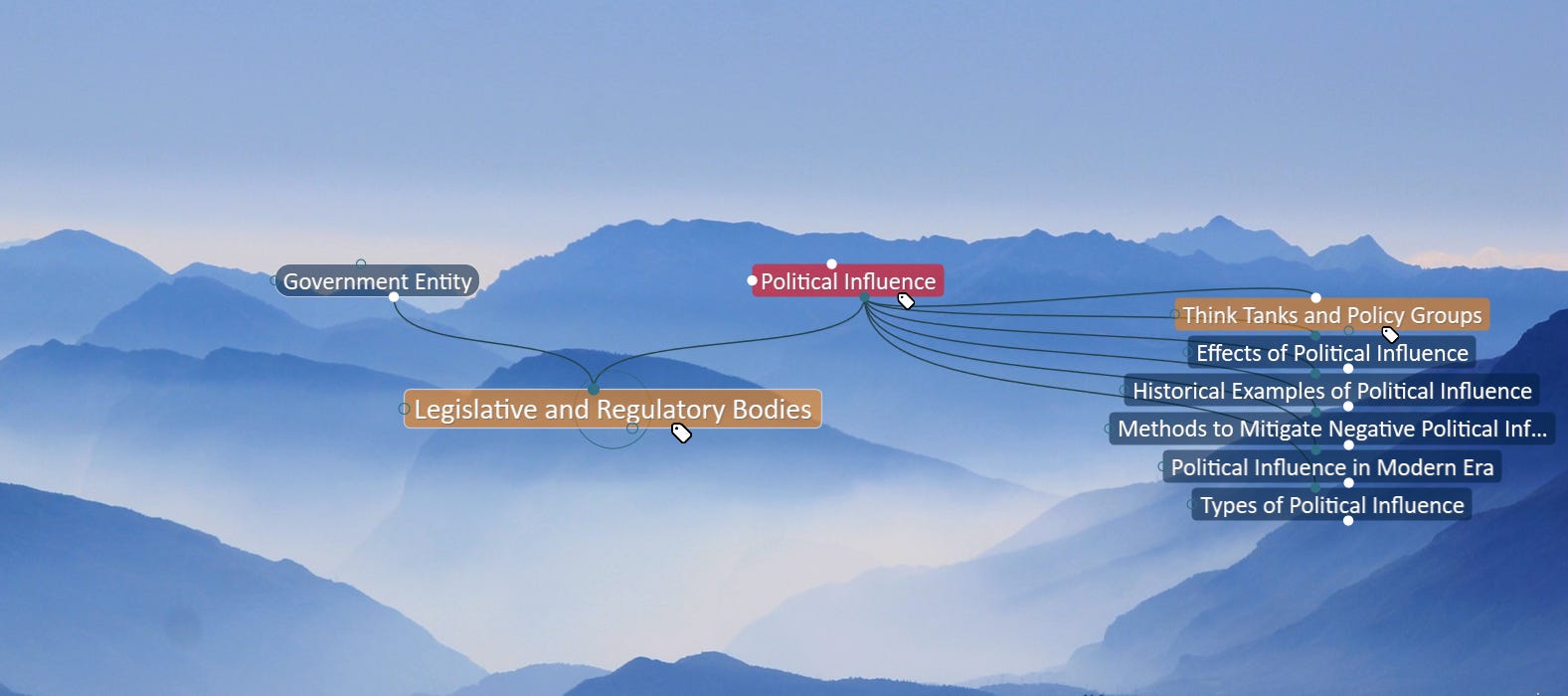
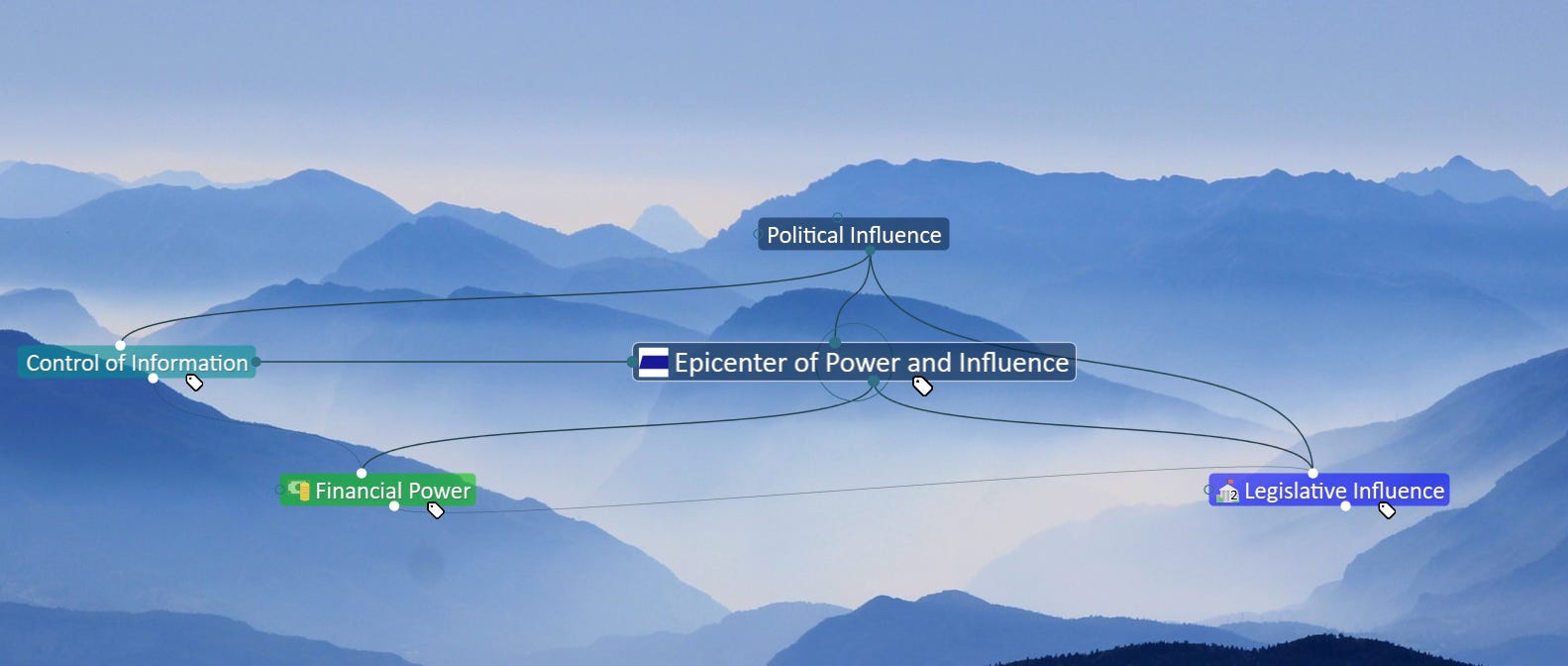
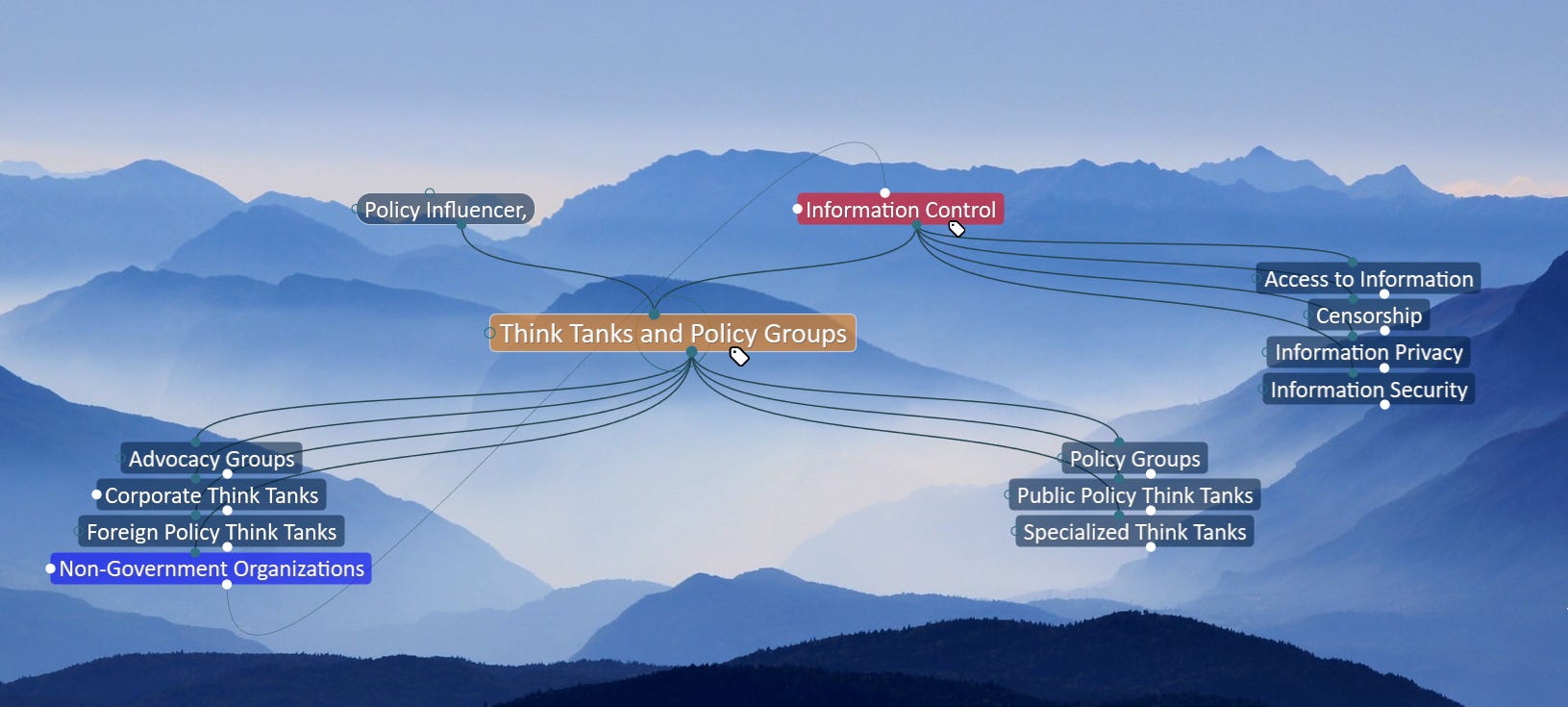
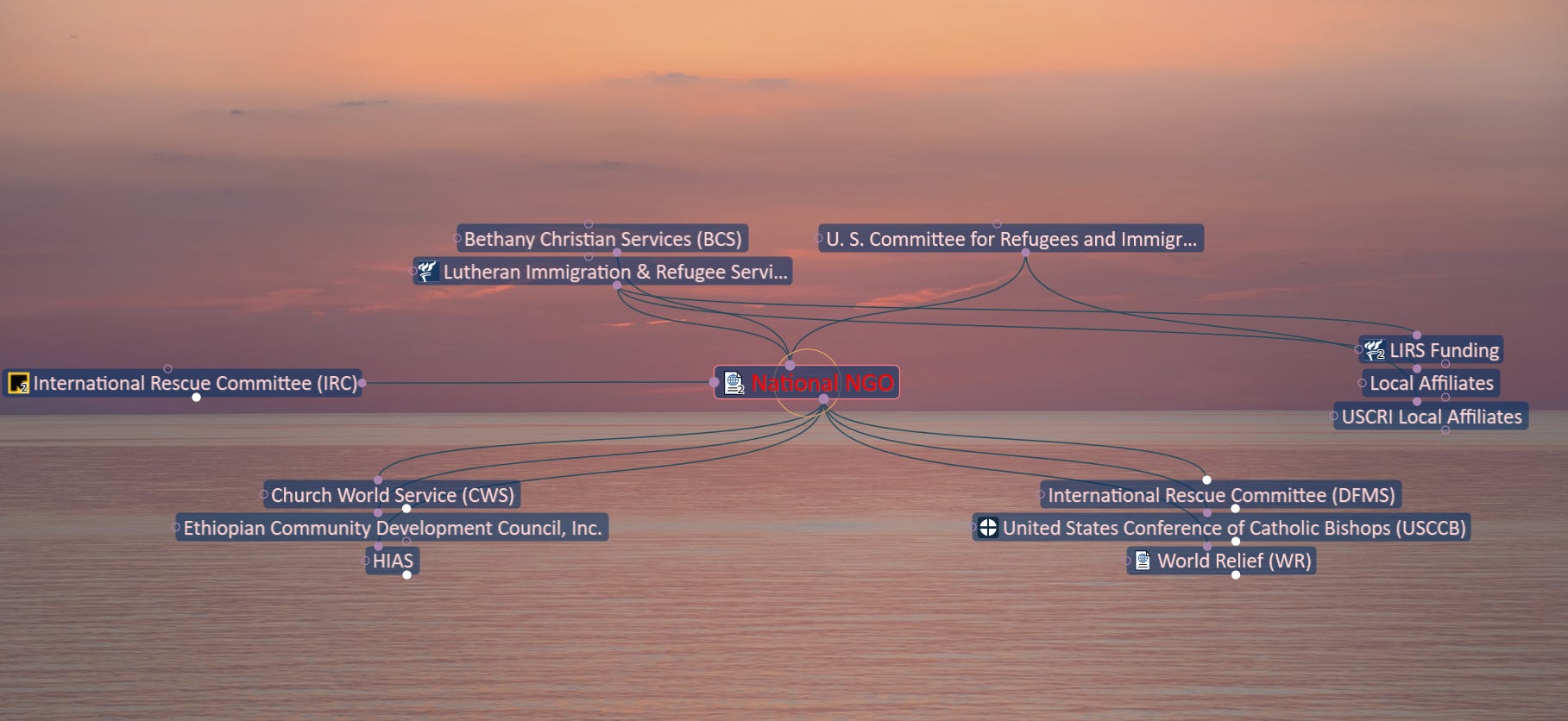
Thank you for describing the use of power and interconnections in governance. I remember when lobbying wasn’t allowed. The vast increases in knowledge and technology ‘required’ the use of think tanks, etc. NGOs have definitely become an area used to insert their goals. At least to some level, most of these organizations have influenced more than authorized and no longer represent the interests of the people, but only the interests of their funding sources that typically are at odds with the will of the people. The amount of unconstitutional power in many of these entities makes them more powerful than the branches of government. “The power dynamics in one domain can ripple through others, illustrating the interconnected nature of financial, political, and information spheres.” True statement.
This is the web of connections that exist and why so much is done without transparency or accountability. Money is influence and influence is power within all entities involved and now the ramifications of using that power ripple across the entire globe (web).
Understanding this is key to clearing out corruption and building trust in the new systems to ensure that the interests of the people, not the interests of global elites, are the focus. Transparency is the key.
Thank you for a great post! Another keeper! God bless you.😍🙏
-- I F YOU ARE C L E A R ABOUT THIS UNENDING REPETITION OF INTERNATIONAL CONSPIRATORS POSITIVELY OVERFLOWING WITH POWER PLOYS AMONGST EACH OTHER, ... P L E A S E GIVE US THE OVERARCHING RESULTING WISDOM, AND, RECOMMENDATIONS -- ALONG WITH REASONS FOR YOUR CONCLUSIONS -- SIMPLY STATED , - I F ANYONE I S TRULY ABLE --- !!! PLEASE TRY TO BE SIMPLE .